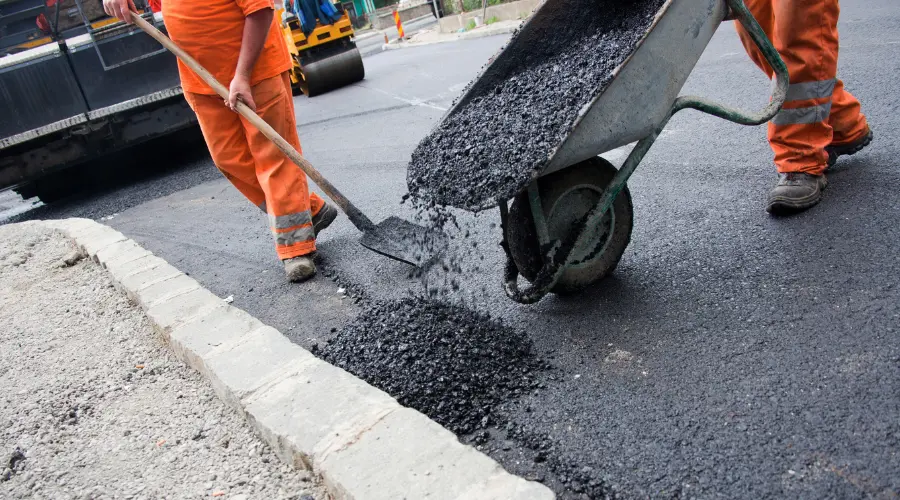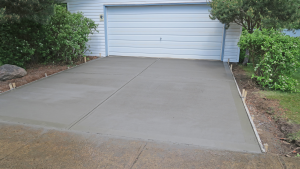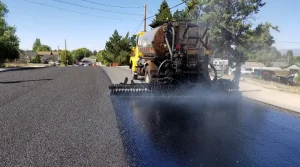Your driveway isn’t just a path to your home—it’s a key element of your property’s curb appeal and functionality. Choosing the right paving material, whether asphalt, concrete, or pavers, can significantly affect your driveway’s appearance, longevity, and maintenance needs. This guide will help you navigate these options to find the perfect fit for your home.
Key Takeaway:
- When selecting a paving material for your driveway, consider factors like budget, aesthetics, durability, and maintenance.
- Asphalt is cost-effective and smooth, concrete offers versatility and low upkeep, while pavers provide unmatched beauty and easy repairs.
- Understanding these options ensures a choice that enhances your home’s value and functionality.
Why Choosing the Right Driveway Material Matters
A driveway is more than just a place to park your car; it contributes to your home’s first impression and overall value. The right paving material can enhance your home’s aesthetics while ensuring durability and minimal upkeep. With asphalt, concrete, and pavers being the top choices, understanding the strengths and weaknesses of each is crucial for making an informed decision.
Comparing Residential Paving Materials
1. Asphalt Driveways
Pros:
- Affordability: Asphalt is one of the most budget-friendly paving options available, making it ideal for homeowners looking for cost-effective solutions.
- Smooth Surface: Provides a sleek, uniform look and a comfortable driving experience.
- Quick Installation: Asphalt driveways can be installed relatively quickly, often within a day or two.
Cons:
- Maintenance: Requires regular sealing every few years to prevent cracks and extend lifespan.
- Limited Aesthetic Options: Asphalt typically comes in black, offering fewer design possibilities.
- Durability Concerns: May soften in extreme heat or crack in cold climates, and it doesn’t handle heavy loads as well as concrete or pavers.
Ideal For: Homeowners seeking a cost-effective, quickly installed option that provides a clean, simple look.
2. Concrete Driveways
Pros:
- Low Maintenance: Concrete driveways are highly durable and require less frequent maintenance compared to asphalt.
- Aesthetic Versatility: Can be stamped, stained, or textured to create a variety of finishes and colors, enhancing curb appeal.
- Longevity: With proper care, concrete driveways can last 30 years or more.
Cons:
- Higher Initial Cost: More expensive upfront compared to asphalt.
- Cracking: Susceptible to cracking, particularly in areas with freeze-thaw cycles.
- Longer Installation Time: Takes longer to cure and set, extending the installation process.
Ideal For: Homeowners prioritizing longevity and customizable aesthetics who are willing to invest more upfront.
3. Paver Driveways
Pros:
- Aesthetic Appeal: Offers endless design possibilities with various shapes, colors, and patterns, allowing for a truly unique look.
- Durability: Pavers are incredibly durable, resisting cracking and withstanding heavy traffic and harsh weather conditions.
- Easy Repairs: Damaged pavers can be easily replaced individually without disturbing the rest of the driveway.
Cons:
- Cost: Typically the most expensive option due to materials and labor.
- Weed Growth: Gaps between pavers can allow weeds to grow, requiring regular maintenance.
- Complex Installation: Requires skilled labor and precise installation, increasing time and labor costs.
Ideal For: Homeowners who value design flexibility and durability, and are willing to invest in a premium product.
Factors to Consider When Choosing Paving Materials
- Budget: Determine how much you’re willing to spend upfront and on future maintenance.
- Aesthetic Preferences: Consider how the material complements your home’s style.
- Climate: Choose materials that withstand local weather conditions.
- Maintenance: Evaluate how much time and effort you’re willing to invest in upkeep.
- Longevity: Think about how long you want your driveway to last before needing major repairs or replacement.
Benefits of Durable and Attractive Driveways
Investing in a durable and aesthetically pleasing driveway enhances your home’s curb appeal and increases property value. A well-chosen material not only improves the look of your property but also provides a functional space that can withstand daily wear and tear. Whether you opt for asphalt’s simplicity, concrete’s versatility, or pavers’ elegance, a quality driveway pays off in both beauty and longevity.
Frequently Asked Questions (FAQ)
Q1: How long does each type of driveway last?
- Asphalt: Typically lasts 15-20 years with proper maintenance.
- Concrete: Can last 30 years or more with minimal upkeep.
- Pavers: Often last 30-50 years, thanks to their durability and easy repair options.
Q2: Which driveway material is the easiest to maintain?
- Concrete requires the least maintenance overall, while pavers allow for easy individual repairs. Asphalt needs regular sealing but is quick to repair.
Q3: What is the most affordable driveway material?
- Asphalt is the most budget-friendly option initially, but consider long-term maintenance costs as well.
Q4: How do I prevent weeds from growing between pavers?
- Use polymeric sand between pavers and apply sealant to reduce weed growth. Regular maintenance, such as pulling weeds and applying weed killer, also helps.
Q5: Can I install a driveway myself?
- While asphalt and concrete driveways are best left to professionals due to equipment and expertise needed, paver driveways can be a DIY project if you have the skills and patience for precise installation.
Q6: Which material handles extreme weather best?
- Pavers perform exceptionally well in all climates due to their flexibility and resistance to cracking. Asphalt is ideal for colder regions as it flexes with temperature changes, while concrete may crack in freeze-thaw conditions.
Q7: How long does installation take?
- Asphalt: 1-2 days.
- Concrete: 3-7 days, including curing time.
- Pavers: 3-5 days, depending on the complexity of the design.
Conclusion
Selecting the best paving material for your driveway is a decision that requires careful consideration of cost, aesthetics, maintenance, and durability. Asphalt, concrete, and pavers each offer unique benefits, and the right choice depends on your specific needs and preferences. Consulting with a trusted paving contractor can help ensure you make the best decision, resulting in a driveway that enhances both the functionality and visual appeal of your home.
For expert paving services in Jersey City, trust Jersey City Paving to provide top-quality materials and craftsmanship for your driveway needs!







